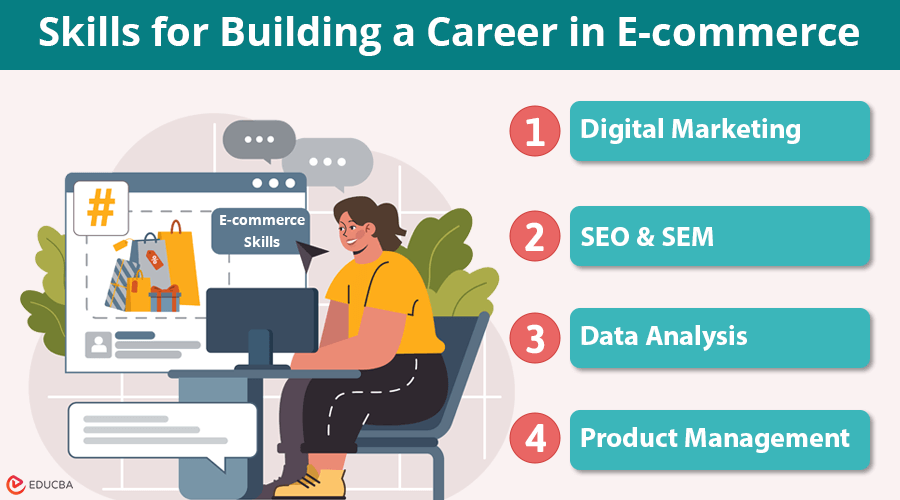
Building a Career in E-commerce
E-commerce is booming, offering vast opportunities for professionals who want to succeed in the digital marketplace. The rapid growth of e-commerce has transformed how businesses market and sell products and services, creating new pathways for entrepreneurs and established companies.
Whether you are new to the business or seeking to expand your expertise, building a career in e-commerce requires understanding how industry needs shift and evolve.
The Growth of E-commerce and Career Opportunities
Traditional retail has been overtaken by the convenience of e-commerce, making it an integral part of the global economy. In 2024, global retail e-commerce will generate over 4.1 trillion U.S. dollars in sales, with expectations for continued growth in the coming years.
This growth is driven largely by the convenience of mobile shopping, where consumers appreciate having items shipped straight to their door. As e-commerce expands, the demand for skilled professionals grows as well. Businesses seek experts who can create seamless shopping experiences across multiple channels.
Common career paths in e-commerce include:
- Digital Marketing
- Product Management
- Logistics
- Customer service
Additionally, specialized roles such as SEO specialists and data analysts are becoming increasingly valuable.
Critical Skills for E-commerce Success
While the skills needed in e-commerce can vary by role, having a well-rounded foundation is beneficial for anyone building a career in e-commerce. Here are some of the most critical skills:
1. Digital Marketing
Digital marketing is the backbone of e-commerce, affecting decisions in every business area. From social media marketing to paid advertising, mastering digital marketing helps drive traffic, increase sales, and build brand presence.
Some key areas within digital marketing include:
- Social media (X, Facebook, Instagram, TikTok)
- Email marketing
- Paid advertising
2. Search Engine Optimization (SEO) and Marketing (SEM)
SEO and SEM are vital components of building a career in e-commerce. SEO professionals optimize websites to improve rankings on search engines like Google. SEM complements this by driving traffic through paid ads. These techniques boost a company’s online presence, increasing sales and brand awareness.
3. Data Analysis
Data is the lifeblood of e-commerce, but raw data alone is not enough. Professionals in data analysis interpret data to reveal patterns, trends, and insights into consumer behavior. This analysis helps businesses optimize marketing campaigns and improve decision-making.
4. Product Management
Product managers are responsible for managing product and service development and overall life. They need to understand consumer preferences and market trends to succeed in this role. They also need good communication skills and the ability to balance customer demand with available inventory.
Why Multichannel E-commerce is the Future?
Multichannel e-commerce means selling products across various platforms rather than relying on just one. This approach is critical for companies aiming to maximize their reach. Popular platforms include Shopify, Etsy, Amazon, eBay, and social media channels.
Benefits of a multichannel approach include:
- Broader reach: Reaching a wider audience increases the chances of converting new customers.
- Increased sales: Listing products on major platforms like Amazon can boost sales.
- Risk mitigation: Relying on multiple platforms reduces the risk of losing sales if one platform experiences issues.
E-commerce professionals who understand how to navigate and optimize various sales channels become invaluable assets to their companies.
The Role of Technology and Tools
Technological advancements and the right tools can significantly improve efficiency and effectiveness for e-commerce professionals. Here are some essential tools for those building a career in e-commerce:
- SEO and analytics tools: Help track website performance, keyword rankings, and customer behavior.
- Multichannel e-commerce software: Multichannel e-commerce software streamlines managing multiple platforms, automates inventory management, and handles order fulfillment.
- Payment processing tools: Solutions like Square, PayPal, and Stripe are vital for online sales.
- Customer relationship management (CRM) tools: CRM helps businesses manage customer interactions and create customized marketing campaigns across different channels.
Career Pathways and Certifications
As you focus on building a career in e-commerce, consider certifications that can enhance your employability in your chosen field. Here are some certifications for various career pathways:
- E-commerce manager: Google’s Digital Marketing & E-commerce Certification
- SEO specialist: HubSpot’s SEO Certification, Google Analytics Individual Qualification
- Product manager: Certified Scrum Product Owner
- Data analyst: Google’s Data Analytics Professional Certificate, IBM Data Analyst Professional Certificate
Final Thoughts
Building a career in e-commerce offers many opportunities, thanks to the industry’s rapid growth and innovative potential. Professionals can excel in this dynamic and fast-paced field with the right skills, tools, and a multichannel approach. Whether starting or looking to advance, leveraging the best technology and keeping up with industry trends will help ensure your success.
Recommended Articles
We hope this guide to building a career in e-commerce inspires you to pursue your ambitions in this booming industry. Check out these recommended articles for further insights and strategies to help you succeed in your e-commerce journey.
